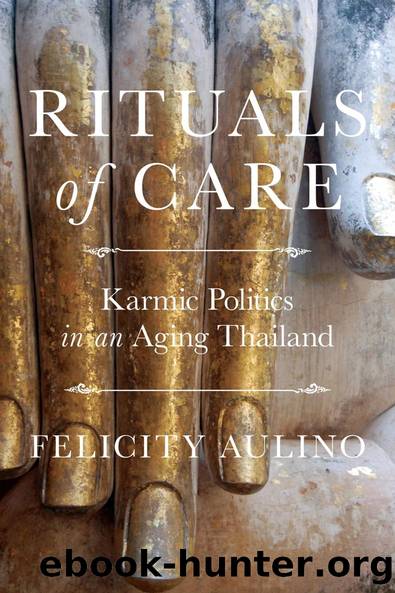Rituals of Care by Felicity Aulino

Author:Felicity Aulino [Aulino, Felicity]
Language: eng
Format: epub
ISBN: 9781501739736
Barnesnoble:
Publisher: Cornell University Press
Published: 2019-10-15T00:00:00+00:00
Governance, Stigma, Patronage, and Power
The Volunteer Spirit Network has three major sponsors. One is the Thai Health Promotion Foundation (or Saw Saw Saw, สสส), the major health-funding arm of the Thai government, which is financed by a major tobacco and alcohol tax settlement. (Saw Saw Sawâs involvement is not surprising, as it plays a major role in all the organizations I discuss in this chapter.) Another is the TRRM, the Thailand Rural Reconstruction Movement. Although one of the earliest and most revered NGOs in Thailand (founded by Puey Ungphakorn), the TRRM has been criticized by more radical elements of society for its increasingly conservative agenda. Many see its current status, âunder royal patronage,â as most telling of its activities. Finally, the Thai âMoral Centerâ (SÅ«n Khuntham, ศูà¸à¸¢à¹à¸à¸¸à¸à¸à¸£à¸£à¸¡)âalso known as the Office for the Service and Development of Knowledge Organizations (samnakngÄn bÇ«rihÄn læ phatnÄ`ong khwÄmrÅ« (`ongkÄnmahÄchon), สำà¸à¸±à¸à¸à¸²à¸à¸à¸£à¸´à¸«à¸²à¸£à¹à¸¥à¸°à¸à¸±à¸à¸à¸²à¸à¸à¸à¹à¸à¸§à¸²à¸¡à¸£à¸¹à¹ (à¸à¸à¸à¹à¸à¸²à¸£à¸¡à¸«à¸²à¸à¸))âis a public agency established by royal decree in 2004 with the mission to promote morality and development in the Thai population. On its board are such prominent people as the award-winning CEO of the Siam Commercial Bank, along with other leading public figures. The patronage of the Volunteer Spirit Network can thus be understood as primarily royalist, with a strong mandate for maintaining the status quo, despite its rhetoric for social change.
The social engineering involved does evoke biopolitics, as witnessed globally. One can read biopower in the Thai stateâs aging-population policy agenda: therein, aging bodies are increasingly defined by and put under the auspices of the state, which seeks to foist an internalization of self-help and community care onto the populace so that its rule is supported by the people âcaring for themselvesâ in the name of good citizenry. Appeals for aid must be made in a way that casts oneâs body outside the typical purview of caring Thai neighbors. State recognition of someone as a helpful actor relies on a presentation of heartfelt motivation. But such a theoretical rubric, while very helpful for seeing rhetorical drives at the policy and programming level, is too blunt a tool for assessing the sectarian rifts and other particularities of the Thai situation. Ontological politics are at play here, and competing phenomenological protocols at stake.
The present structure and maneuvering of the Volunteer Spirit Network is a function of over fifty years of NGO operations in Thailand. NGOs are of course a potentially powerful force in any society, a force that governments have a keen interest in monitoring and controlling. That the network is officially recognized and sanctioned as such is, in part, a function of the National Cultural Act of 1942, which ordered organizations to register with the government âto ensure state control over a growing and potentially threatening sectorâ (Yamamoto 1995, 245â246). Again, in 1985, the government of Prime Minister Prem (1980â1988) initiated the NGO coordinating Committee on Rural Development, or NGO-CORD, âto bring NGO efforts into range of the governmentâs radarâ (Simpkins 2003, 258).24
In broad strokes, the establishment of the Culture Ministry under the
Download
This site does not store any files on its server. We only index and link to content provided by other sites. Please contact the content providers to delete copyright contents if any and email us, we'll remove relevant links or contents immediately.
Spare by Prince Harry The Duke of Sussex(5196)
Tuesdays with Morrie by Mitch Albom(4784)
For Baby's Sake(4571)
Machine Learning at Scale with H2O by Gregory Keys | David Whiting(4313)
Never by Ken Follett(3956)
The Five People You Meet in Heaven by Mitch Albom(3568)
Fairy Tale by Stephen King(3396)
Reminders of Him: A Novel by Colleen Hoover(3116)
Will by Will Smith(2919)
Tuesdays With Morrie by Mitch Albom(2762)
The Clitoral Truth: The Secret World at Your Fingertips by Rebecca Chalker(2720)
Borders by unknow(2313)
Friends, Lovers, and the Big Terrible Thing by Matthew Perry(2230)
The Body Keeps the Score by Bessel van der Kolk MD(2217)
Cruel to Be Kind by Cathy Glass(2205)
The Stranger in the Lifeboat by Mitch Albom(2121)
Love on the Brain by Ali Hazelwood(2078)
Finding Chika by Mitch Albom(1968)
New Morning Mercies: A Daily Gospel Devotional by Paul David Tripp(1919)
